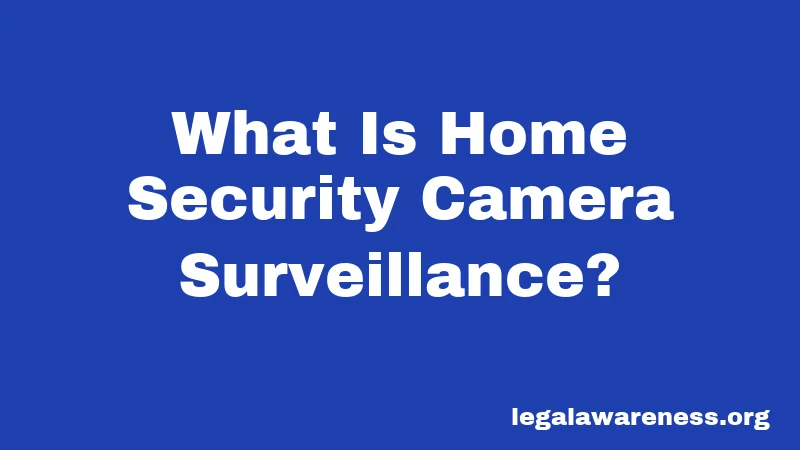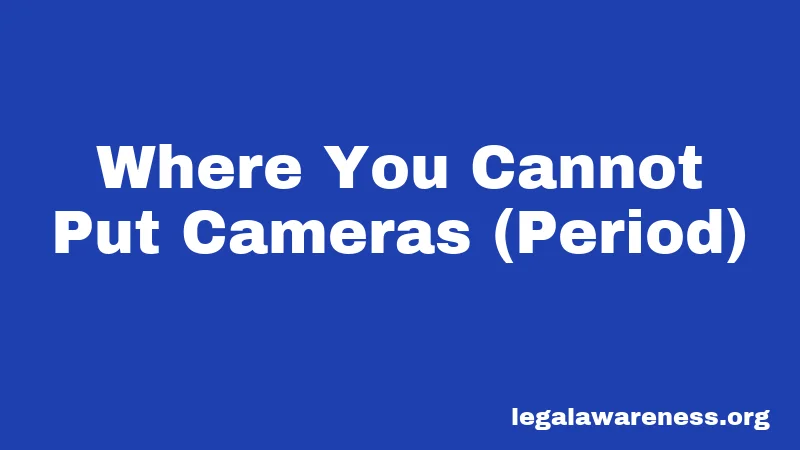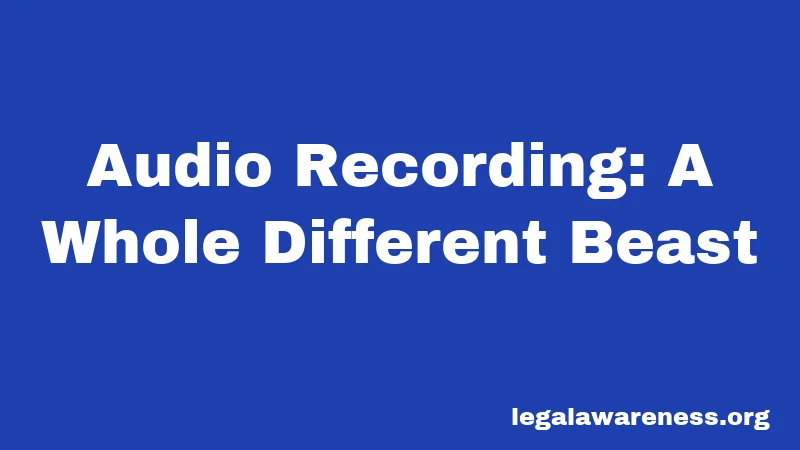New York Home Security Camera Laws (2026): What You Can Actually Record
Most people have no idea how strict New York’s camera laws actually are. You could install cameras everywhere in your home and still break the law. The difference comes down to one simple word: privacy. Let’s break down exactly what’s legal and what could land you in serious trouble.
You’re allowed to protect your home. Just not the way you might be thinking.
What Is Home Security Camera Surveillance?

Home security cameras record video of your property and surroundings. They’re great for catching burglars, monitoring packages, or just feeling safer. But here’s the thing: New York treats privacy like a sacred right. That means you can’t just point a camera anywhere you want.
Think of it like this. Your right to security ends where someone else’s right to privacy begins.
Can You Actually Install Cameras in Your Home?
Short answer? Yes. Long answer? It depends on where you put them.
Installing security cameras on your residential property is totally legal in New York. You can put them outside your home, in your living room, in your kitchen, anywhere inside. But—and this is a big but—you cannot record people when they have a reasonable expectation of privacy.
What does “reasonable expectation of privacy” mean? It means places where someone would reasonably expect to be alone or undisturbed. Let’s talk about the specific rooms where you absolutely cannot put cameras, ever.
Where You Cannot Put Cameras (Period)

Stay with me here. These are the critical rules.
You cannot install cameras in bathrooms. Not even if it’s your own bathroom and you live alone. The law treats bathrooms as sacred privacy zones. Same rule applies to bedrooms, changing rooms, and shower areas. Your guests’ bedrooms are off-limits too. If you have a live-in nanny, her private bedroom is protected. Even fitting rooms or dressing rooms in your home cannot have cameras.
Basically, anywhere someone would be naked or changing clothes is completely off-limits. This isn’t complicated. Honestly, it makes sense.
The penalties for this? Serious. We’ll get to those in a moment.
Outside Cameras: The Neighbor Problem
Okay, here’s where it gets tricky. You can put cameras outside your home. But if they point into your neighbor’s yard, you’re in trouble.
In 2017, New York updated its privacy laws specifically about this. Your neighbor has a reasonable expectation of privacy in their backyard. They don’t want their kids on camera while playing outside. They don’t want you recording their patio or deck. If your camera points that way, you could face a civil lawsuit.
Not sure what counts as pointing into their space? If you can see into their windows, their backyard, or their outdoor living areas, your camera is aiming the wrong way. You should adjust it to cover only your own property and the front areas of your home.
Wondering if this applies to you? Check where your cameras point. Does your neighbor’s property appear in the frame? That’s the problem.
Audio Recording: A Whole Different Beast

Wait, it gets more complicated. Video is one thing. Audio is completely different.
New York is a one-party consent state for audio recording. That sounds good, right? It means you can record conversations where at least one person (you) knows it’s being recorded. But here’s the catch: you cannot record audio in private places without consent.
If you have a camera with a microphone in a bedroom or bathroom, you’re violating federal wiretapping laws. That’s not a civil issue. That’s criminal. You could face felony charges just for the audio portion alone.
Pretty straightforward: Video is okay in many places. Audio without consent is a federal crime. Don’t record sound without permission.
Serious Crime: Unlawful Surveillance Charges
Okay, pause. Read this carefully.
New York Penal Law treats illegal surveillance incredibly seriously. If you intentionally record someone in a private place without their knowledge or consent—especially if they’re changing, undressing, or in any intimate situation—you’re committing a felony. Not a misdemeanor. A felony.
Specifically, violating New York Penal Law Section 250.45 (Unlawful Surveillance in the Second Degree) is a Class E felony. That means up to four years in prison. You’d also be required to register as a sex offender for life.
First offense: Up to four years in prison. Second offense: Up to seven years. These aren’t small penalties. These are life-altering consequences.
Many people assume this only applies to hidden cameras. It doesn’t. It also applies if you record someone in a place where they have a reasonable expectation of privacy. Even if the camera is visible. Even if you own the property.
This one’s probably the most important rule. Don’t skip over it.
Workplace Cameras: Special Rules for Employers
Things get different if you’re a business owner. You can install cameras in your workplace. But you have specific legal obligations.
If you’re a private employer in New York, you must notify all employees about electronic monitoring. You need to post conspicuous signs. Your employee handbook must mention it. You must get written acknowledgment from each employee that they received this notice.
The penalties? They’re steep. First violation: up to $500. Second violation: up to $1,000. Third and beyond: up to $3,000 per violation.
Not sure what counts as a violation? Not posting signs. Not getting written acknowledgment. Updating your system without telling employees. All of these trigger penalties.
What About Your Tenants?
This is important if you own rental property.
You cannot install cameras in common areas that tenants share without their knowledge. Your tenants have a reasonable expectation of privacy in their rented space. A landlord secretly recording a tenant is a serious violation. The tenant could sue you civilly. You could also face criminal charges.
If you install cameras in truly public common areas (like a hallway for security purposes), you should still post notices. Give your tenants warning. Better safe than sued.
Recent Changes: The Smart Device Privacy Act
Hold on, this part is important. New York just passed new protections for smart cameras.
In 2025, lawmakers introduced the Smart Surveillance Device Privacy Act. This would require law enforcement to get a warrant before accessing footage from your home security system. Right now, police can sometimes access footage without a warrant if the company hands it over.
The new law (still moving through the legislature) would protect your privacy from government access. But here’s what it means for you right now: be careful about which cloud services you use. Check your camera company’s privacy policies. Understand who can access your footage.
Audio Recording at Your Front Door
You’re probably thinking about Ring doorbells. They’re everywhere in New York.
Your doorbell camera can record video of visitors and your front porch without issues. But recording audio without their knowledge? That’s a one-party consent issue. Technically, if you’re the one with the camera, you’re the consenting party.
Still, here’s the practical reality: courts sometimes disagree about this. If someone comes to your door and doesn’t expect audio recording, they could argue you violated their privacy. It’s safer to disable audio recording or post clear signs that audio is being recorded.
Sound complicated? It’s actually not if you just err on the side of caution.
Penalties: What Happens If You Break These Laws
Let’s be clear about the real consequences.
If you violate unlawful surveillance laws (recording someone in a private place without consent), you’re facing a Class E felony. That’s up to four years in prison, plus sex offender registration. This applies even if nobody ever sees the footage.
If you distribute images obtained illegally? That’s an additional crime. Dissemination of an unlawful surveillance image is a Class A misdemeanor. That’s up to one year in jail on top of everything else.
If you’re an employer who doesn’t notify employees about cameras, you face $500-$3,000 per violation.
If you’re pointing cameras into a neighbor’s private space, they can sue you civilly. You could owe damages. You might have to pay their legal fees.
Your choice of camera placement could literally change your life. Choose wisely.
How to Install Cameras Legally
Here’s what you actually need to do.
First, identify what you want to protect. Is it your front door? Your driveway? These areas are fine. Install cameras covering only your property.
Second, never point cameras at windows, backyards, or patios. Cover only your own space. If there’s any doubt, angle it down or away.
Third, make sure cameras are clearly visible (unless they’re inside your own home in non-private areas). Hidden cameras in private spaces are automatic felonies.
Fourth, if you’re recording audio, disable it or post clear signs. “Audio Recording in Progress” is simple and effective.
Fifth, if you own a business or rental property, post signs and document employee notifications. Keep written acknowledgments on file.
Honestly, this is the part most people miss. Take the time to do it right.
What About New York City Specifically?
New York City has even more surveillance than most areas. The city has about 85,000 security cameras. The NYPD uses 22,000 of them through their Domain Awareness System.
But none of that changes residential privacy laws. Your home is still your castle. The same rules apply.
You might think, “Well, the city has cameras everywhere.” That doesn’t mean you get to. Government surveillance and private surveillance are completely different. Don’t make that mistake.
Do You Need a License?
This depends on what kind of system you’re installing.
If you’re installing a security system (which usually means a monitored system connected to a company), you might need a license from the New York State Department of State. Call them and ask. They’ll tell you specifically what you need.
If you’re just installing cameras without a monitored security system, you probably don’t need a license. But the privacy rules still apply. A license doesn’t give you permission to record anything. It just means your installation company is registered.
Frequently Asked Questions
Can I point a camera at my driveway if it captures the street behind it?
Yes, as long as you’re genuinely trying to monitor your driveway. You cannot deliberately position it to record the public street or neighbors’ properties. Keep the focus on your own space.
What if my camera accidentally records my neighbor through a window?
If it’s accidental and you immediately address it when discovered, you likely have less legal risk. But if you know about it and do nothing, the neighbor could sue. Fix the angle immediately.
Can I record audio on my baby monitor in the nursery?
Yes. You’re recording your own child in a space you control. But you cannot record anyone else’s bedroom or bathroom, even your spouse’s, without consent.
Do I need to tell guests they’re on camera?
It’s not legally required if the camera is visible. But if someone asks, you must tell them. Hidden cameras in common areas of your home could still be problematic.
What if someone breaks into my home and my camera catches them?
You can absolutely use that footage with police. Your camera can be extremely helpful in a break-in. Just follow all the rules about placement so the footage is admissible in court.
Final Thoughts
New York takes privacy seriously. Your security cameras should too.
You can protect your home. You just need to do it the right way. Never record in private places. Never point cameras at neighbors. Never record audio without consent. Post signs if you’re running a business.
Stay informed, stay safe, and when in doubt, check with a lawyer before installing cameras. Your home security is important. Just don’t sacrifice someone else’s privacy to get it.
References
- New York Penal Law Section 250.45 – Unlawful Surveillance in the Second Degree
- New York State Department of State – Security Guard License Information
- New York Penal Code Article 250 – Offenses Against Right to Privacy
- New York Labor Law Section 203-C – Electronic Monitoring in the Workplace
- 2025 MTA Security Camera Act – NYC Transit Authority
- New York Smart Surveillance Device Privacy Act (2025) – Assembly Bill A9062
- New York Courts – Jury Instructions on Unlawful Surveillance

What can be done when your neighbor violates this law and only films your property? He used these videos falsely.
Is there a law number to refer to to ask the neighbor to remove it from viewing you property immediately?